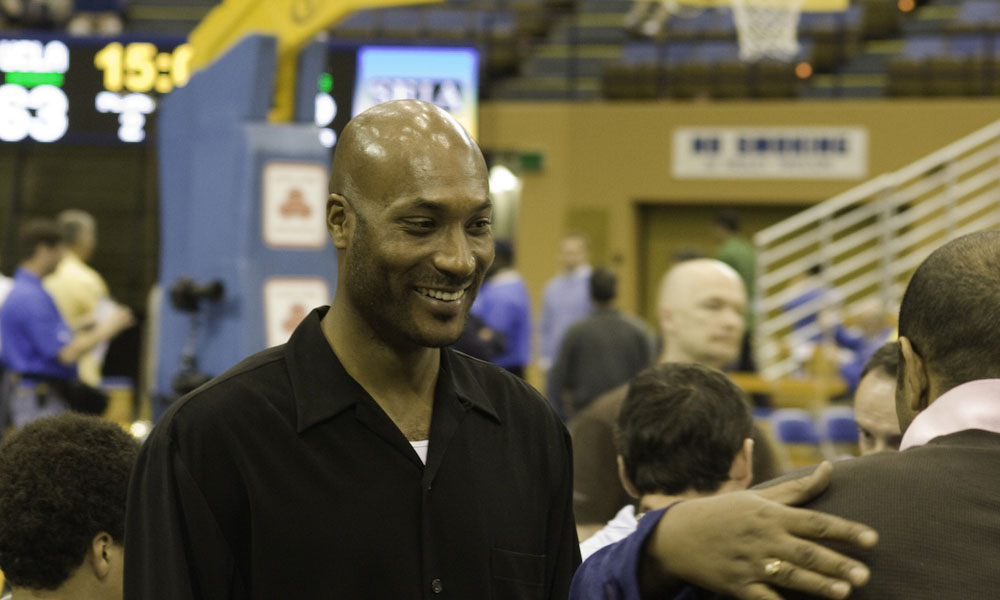
Could College Players Form an Association to Protect Likeness Rights?
Last week's ruling allowing current and former college athletes to move forward with a class-action lawsuit over name and likeness rights sets up an interesting possibility: Players could form a trade group to work out licensing issues, one legal expert says.
Last week’s ruling allowing current and former college athletes to move forward with a class-action lawsuit over name and likeness rights sets up an interesting possibility: Players could form a trade group to work out licensing issues, one legal expert says.
The 1994 movie Blue Chips, a Nick Nolte film about college basketball, raised a question that’s still being asked to this day: If these star players are so important to success of college sports, why don’t they get paid for their services?
It only makes sense that, two decades later, a former player from the Blue Chips era is at the forefront of efforts to answer that very question—with the help of a recent court ruling.
While we are disappointed that the court did not permit the athletes to seek past damages as a group, we are nevertheless hopeful that the court’s decision will cause the NCAA to reconsider its business practices.
More on a case that started with one player but could turn college sports on its head:
The case: In 2009, former UCLA basketball star Ed O’Bannon noticed that a player in a video game featuring classic college basketball teams bore a likeness to him. After consulting with a lawyer, he filed a lawsuit against the National Collegiate Athletic Association, claiming that the NCAA violated antitrust law by prohibiting student athletes from entering into commercial agreements to license their own names and likenesses. He sought class-action status so that he could represent other current and former college athletes in seeking compensation for past and future financial losses caused by the NCAA rule. Last summer, during the litigation, the NCAA ended a long-term licensing deal with Electronic Arts, which created the game that used O’Bannon’s likeness.
The decision: On Friday, the federal judge in California hearing the case granted partial class-action certification. U.S. District Judge Claudia Wilken ruled [PDF] that current and former Division I men’s basketball and football Bowl Subdivision team members could, as a group, challenge the NCAA policy prohibiting players from being compensated for use of their names and likenesses. But she denied their request to seek damages for past use. Though that still leaves the door open for individual suits for damages, the NCAA saw that part of the decision as a victory, with chief legal officer Donald Remy noting in a statement that damages claims “going back nearly a decade would be completely unmanageable and unprecedented.” Lawyers for the plaintiffs were nonetheless pleased. “The court’s decision is a victory for all current and former student-athletes who are seeking compensation on a going-forward basis,” said Michael Hausfeld, who represented the players, in a news release. “While we are disappointed that the court did not permit the athletes to seek past damages as a group, we are nevertheless hopeful that the court’s decision will cause the NCAA to reconsider its business practices.”
Could the next step be a trade group for players? That’s a question raised by Sports Illustrated columnist and legal expert Michael McCann, who notes that a class-action lawsuit could suddenly create a demand for an organized system to help work out licensing deals, getting around the issues raised by O’Bannon’s lawsuit. There could be other benefits for players as well. “The trade association would also seek negotiated compensation for college athletes in the form of long-term disability and pension benefits,” McCann writes. “Many of the trade association’s goals would embrace those of the National College Players’ Association, a California-based advocacy group for college athletes’ rights.” The lawsuit is not the only factor driving this issue: Last month, the Grambling State University football team essentially went on strike and forfeited a game, citing poor practice and playing conditions.
However, McCann writes, a trade group may not come in time to help former players like O’Bannon, a major college star who was unable to find success in the NBA and now has a career outside of basketball. The court’s denial of the class action for damages claims means it’s unlikely that O’Bannon and former college stars will receive compensation in a suit.
“This is disappointing news for those players’ attorneys, who have spent considerable resources on the case in hopes of gaining a sizable share of an award or settlement,” McCann writes.
Former NCAA basketball star Ed O'Bannon, who sparked the class-action suit. (photo by Jack Rosenfeld/Wikimedia Commons)






Comments